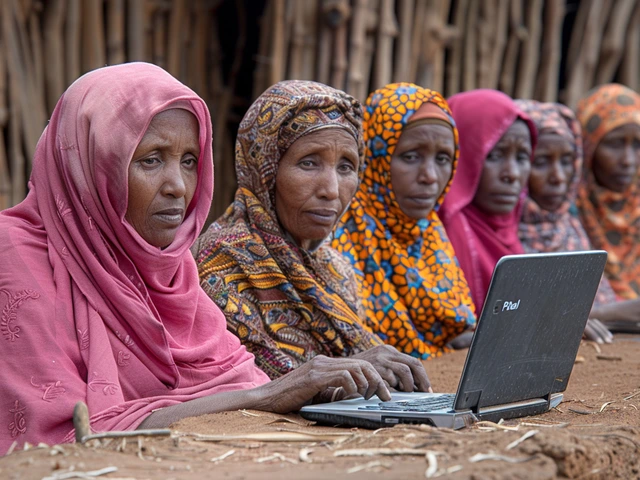Understanding the Cost of Living in Ethiopia
As someone who has been living in Addis Ababa, Ethiopia for the past few years, I have gained a deep understanding of the cost of living in this vibrant and culturally rich country. Ethiopia, with its ancient history and stunning landscapes, has become an increasingly popular destination for expats and travelers alike. However, before making the move, it's crucial to have a clear idea of how much money you'll need to live comfortably here.
To begin with, it's important to note that the cost of living in Ethiopia is relatively low compared to many other countries. According to Numbeo, a global database of user-contributed data about cities and countries worldwide, the cost of living in Ethiopia is
"58.5% lower than in the United States". This means that your money can go a long way in Ethiopia, allowing you to enjoy a comfortable lifestyle without breaking the bank.
Housing and Accommodation Costs
One of the most significant expenses when living in Ethiopia is housing. The cost of rent varies depending on the location and type of accommodation you choose. In Addis Ababa, the capital city, you can expect to pay anywhere from $300 to $1,000 per month for a decent apartment. The lower end of the spectrum will get you a simple, one-bedroom apartment in a less central area, while the higher end will secure a spacious, modern apartment in a prime location.
If you're looking to save money on housing, consider sharing an apartment with roommates or opting for a smaller studio. Additionally, living outside of the city center can significantly reduce your rent expenses. Just be prepared for longer commute times and potentially less developed infrastructure.
Transportation and Getting Around
Transportation costs in Ethiopia are relatively affordable, especially if you rely on public transport. The most common mode of public transportation in Addis Ababa is the city bus system, which is cheap and efficient. A single ride on the bus typically costs around 10 Ethiopian Birr (approximately $0.20). Taxis are also readily available and offer a more convenient option, with fares starting at around 100 Birr ($2) for short trips within the city.
If you plan on driving your own vehicle, keep in mind that the cost of purchasing and maintaining a car in Ethiopia can be quite high. Fuel prices are also relatively expensive, so factor that into your budget if you intend to drive frequently.
Food and Dining Expenses
Ethiopian cuisine is known for its delicious and unique flavors, and the good news is that eating out in Ethiopia is incredibly affordable. A meal at a local restaurant can cost as little as 50 Birr ($1), while a mid-range restaurant might set you back around 200-300 Birr ($4-$6) per person. If you prefer to cook your own meals, grocery prices are also quite reasonable. Here's a quick breakdown of some essential food items and their average costs:
- 1 liter of milk: 50 Birr ($1)
- 1 loaf of bread: 20 Birr ($0.40)
- 1 kg of rice: 60 Birr ($1.20)
- 1 kg of chicken: 200 Birr ($4)
By cooking at home and shopping at local markets, you can easily keep your food expenses under control.
Budgeting for a Comfortable Life
So, how much money do you need to live comfortably in Ethiopia? Based on my experience and the expenses outlined above, I would recommend budgeting at least $1,000 to $1,500 per month. This amount will cover your basic living expenses, such as rent, food, transportation, and utilities, while also allowing for some discretionary spending on entertainment, dining out, and exploring the country.
Of course, your actual expenses will depend on your lifestyle and personal preferences. If you enjoy a more luxurious lifestyle or frequently engage in expensive hobbies, you may need to budget more. On the other hand, if you're a frugal spender and don't mind living in a more modest accommodation, you could potentially get by on less.
It's also worth noting that while the cost of living in Ethiopia is relatively low, salaries tend to be lower as well. If you're planning to work in Ethiopia, make sure to research the average salaries in your field and factor that into your budgeting decisions.
In conclusion, living comfortably in Ethiopia is achievable with a budget of $1,000 to $1,500 per month. By being mindful of your expenses and making smart financial choices, you can enjoy all that this beautiful country has to offer without straining your wallet. As someone who has fallen in love with Ethiopia's rich culture, friendly people, and stunning landscapes, I can confidently say that the experience of living here is well worth the investment.

 Navigating PayPal Banking Integration in Ethiopia: A Comprehensive Guide
Navigating PayPal Banking Integration in Ethiopia: A Comprehensive Guide
 Exploring Ethiopia's Thriving Agriculture Industry
Exploring Ethiopia's Thriving Agriculture Industry
 Using USD in Ethiopia: What Travelers Need to Know
Using USD in Ethiopia: What Travelers Need to Know
 Why Ethiopia is a Must-Visit Destination: Culture, History, and Natural Beauty
Why Ethiopia is a Must-Visit Destination: Culture, History, and Natural Beauty
 Ethiopian Teacher Salaries: What to Expect in 2024
Ethiopian Teacher Salaries: What to Expect in 2024
love monster
April 5, 2024 AT 22:54Hey folks, diving into the cost dynamics of Addis feels like running a KPI dashboard on a living budget. The rent spectrum you outlined-$300 to $1,000-maps neatly onto tiered service level agreements you’d see in cloud pricing. If you stack a roommate on a $350 unit, you’re essentially achieving a 30% efficiency gain on housing overhead. Public transit’s 10 Birr fare is practically a micro‑transaction, letting you allocate more runway for discretionary spend. Remember to factor in the utility surcharge that can spike during the rainy season; it’s an amortized cost that shows up in the bottom line. For a sustainable cash flow, aim for a buffer of at least 15% of your monthly outlay. Keep an eye on exchange rate volatility, as that can tilt your real‑world purchasing power in short bursts. Overall, the numbers you posted sit comfortably within a lean‑startup budget model.
Christian Barthelt
April 6, 2024 AT 01:33Your analysis neglects the hidden cost of import tariffs on consumer goods, making the $1,000 figure deceptively low.
Ify Okocha
April 6, 2024 AT 02:56Reading your breakdown feels like walking through a spreadsheet that conveniently omits the hemorrhage of hidden expenses. While you cheerfully quote a 58.5% reduction compared to the United States, you fail to mention that a significant portion of the population subsists on informal economies, which skews the baseline. The rent range you present assumes a stable, middle‑class enclave in central Addis, ignoring the premium attached to expatriate‑friendly compounds that often demand double the quoted price. Moreover, your transportation section glosses over the fact that reliable private vehicle ownership incurs import duties exceeding 150%, not to mention the scarcity of spare parts that can turn a minor repair into a fiscal nightmare. Food costs, although seemingly modest at first glance, are volatile; seasonal fluctuations can double the price of staples like teff and lentils during lean months, eroding any presumed savings. Utilities, especially electricity during peak load, are billed on a tiered structure that can balloon your monthly ledger if you’re not meticulous about consumption. Healthcare expenses for expats are not covered by the public system and can be exorbitant, a factor you conspicuously skip. The cultural expectation of communal dining and hospitality often translates into unbudgeted guest meals that can add up unnoticed. Even the seemingly trivial expense of internet service can climb beyond $50 per month for a stable connection, a line item you omitted entirely. If you factor in the cost of obtaining a work permit, visa renewals, and occasional legal counsel, the financial picture shifts dramatically. The psychological toll of navigating bureaucratic red tape also has an intangible cost, which, while not ledger‑compatible, impacts overall wellbeing. Your recommendation of $1,000 to $1,500 per month is, at best, a rough approximation for a very specific, low‑maintenance lifestyle. It becomes a gross underestimation for anyone seeking a more comfortable or socially integrated existence. In short, your post reads like an optimistic marketing brochure rather than an exhaustive cost audit. Prospective expats would do well to run their own Monte Carlo simulation of expenses before committing to such an optimistic budget.
William Anderson
April 6, 2024 AT 04:20Honestly, this tirade feels like a melodramatic audit that would make even a seasoned CFO cringe; the world isn’t a perpetual crisis, and most expats thrive on the very costs you so dramatically inflate. In reality, a balanced approach to budgeting-mixing local markets with occasional imports-smooths out the spikes you obsess over.
Sherri Gassaway
April 6, 2024 AT 05:43If we view the budgeting exercise as a microcosm of existential equilibrium, the numbers become more than mere figures-they’re signposts of how we negotiate freedom and security. Your KPI analogy hints at a deeper alignment between personal agency and external constraints. Yet, the true measure of comfort lies not in the dollar amount but in the narrative you craft around daily rituals. A modest rent, a reliable bus ride, and a shared meal can collectively forge a sense of belonging that outvalues any financial surplus. In this light, the $1,200 threshold is less a ceiling and more a canvas upon which to paint a purposeful life.